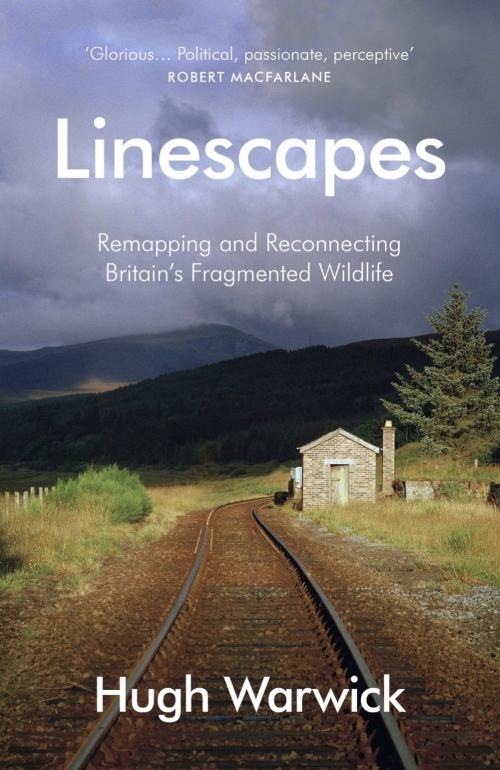Linescapes by Hugh Warwick
'A prophetic noticing and warning of the threat of fragmentation of habitat, as well as the possibilities of reconnection'
 Linescapes – Remapping and Reconnecting Britain’s Fragmented Wildlife
Linescapes – Remapping and Reconnecting Britain’s Fragmented Wildlife
By Hugh Warwick
Square Peg
ISBN: 978-0224100892
Reviewed by Shaun Lambert
Hugh Warwick’s Linescapes – Remapping and Reconnecting Britain’s Fragmented Wildlife is a reading of the man-made lines that dissect our landscapes, the lines of hedges, ditches and dykes, walls, ancient paths and green lanes, canals, railways, roads, and delightfully, pylons and pipelines. As I began to read the book, I recalled a childhood memory of flying in from the spacious plains of Africa and seeing the patchwork green fields of England for the first time from the plane’s window. ‘How small and green and broken up it looks!’ I thought to myself.
The author was first drawn to the idea of these man-made lines as both agents of fragmentation and connection when he immersed himself in hedges doing field work on Britain’s favourite animal, the hedgehog. The book is a prophetic noticing and warning of the threat of fragmentation of habitat, as well as the possibilities of reconnection.
It is both an historic and contemporary reading as we begin with archaeological lines and end with pylons and pipelines. Each chapter has conversation partner(s) as well as forays into European responses to the issues of fragmentation. I would love a map of his travels across the country as he traces these lines of human occupation and ownership across time and place. Each chapter has headlines, that include shocking facts – ‘we have lost 97% of wildlife meadows over the last 70 years,’ and fascinating detail. There are over 30 different types of hedge laying in the UK!
Debates within the world of nature conservation are intelligently outlined, and the author uses a technique of reframing points of controversy for us, so the reader can see different perspectives on often extraordinarily complex issues. He recognises that conservationists may have to work within capitalism to make a case for a ‘capitalized wild’ but argues passionately for the intrinsic and priceless value of our landscape and its wildlife. The author also allows his prejudices to be challenged, especially the potential of canals to be one of the edges of our man-made lines that can be a haven for wildlife.
This is a poetic, humorous, and down-to-earth noticing – a more romantic or dogmatic viewpoint might have excluded possible areas of reconnection. There are many lines of wisdom entering the book and leaving the book, and I want to follow many of them up – the author’s wide reading and learning is put at the service of this book to our benefit as readers. In many ways it is a series of conversations with people who know what they are talking about. My favourite chapter is on the seemingly mystical green lanes, holloways and ancient pathways. If we can see our connection to the past, we can perhaps ensure the same pathways exist for our children.
One of the beauties of the book is that he places the possibility of unfragmentation and reconnection of wildlife to habitat in each of our hands. Whether it is the London garden we spent so much time in over the last 20 odd years, or the 90 acres of estate I now live in as part of Scargill Community in North Yorkshire.
It is with many small steps, like creating a hedgehog-friendly hole in our fences, that we can take the larger steps of reconnection and unfragmentation, that we need, not just for the good of our wildlife and countryside - there is so much evidence that the natural world around us is good for our wellbeing as human beings. I am left with the haunting feeling that his prophetic noticing of fragmentation and the need for reconnection is also a spiritual parable.
Hugh Warwick is an ecologist and author with a particular interest in hedgehogs - three of his five books, so far, have been about the prickly mammal. He is the spokesperson for the British Hedgehog Preservation Society.
Shaun Lambert is a Baptist minister, author and psychotherapist living on community with Scargill Movement, currently exploring mindful community and mindful church.
Baptist Times, 23/04/2021